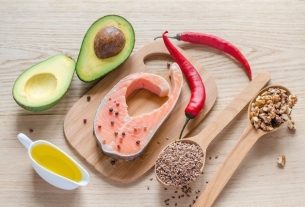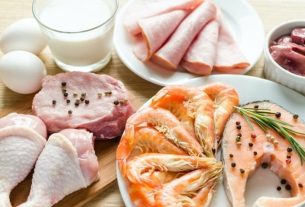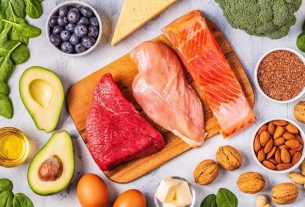Diet during an ulcerative colitis attack is important to control symptoms such as decreased appetite, nausea, vomiting, cramps, diarrhea, constipation, changes in taste and tiredness.
There is currently no specific diet that can be recommended for everyone with ulcerative colitis. Therefore, it is recommended to consult a nutritionist who will create an individualized meal plan, according to the severity, degree of the disease and the symptoms presented.
However, there are some general recommendations that can be followed with the aim of avoiding vitamin and mineral deficiencies, in addition to preventing weight loss, ensuring general health and well-being.

How to know what’s bad
The diet to control colitis attacks varies for each person, and it is necessary to observe which foods worsen digestion, cause pain, diarrhea, constipation or increase intestinal gas.
Therefore, it is advisable to keep a food diary, where you should write down all the foods consumed during the day and the symptoms, if they appear. This will allow you to identify after a few weeks which foods may cause discomfort and which should be avoided.
It is important to note that the foods that cause colitis attacks may vary over time. Therefore, in cases of new crises, it is important to keep the food diary again so that the nutritionist can readjust the diet.
Which specialist to consult
The best way to identify what you can and cannot eat is by consulting a nutritionist or clinical nutritionist, who will help you understand the food diary and also provide guidance on what should be avoided completely or what should be consumed in moderation.
Taking care of your health has never been easier!
Foods that should be avoided
During ulcerative colitis, you should avoid foods that increase inflammation and irritate the intestine, such as:
- Foods rich in fat: fried foods, margarine, butter, soybean, canola or corn oil;
- Caffeine: coffee, green tea, black tea, mate tea, cola and chocolate. These foods should be avoided during diarrhea attacks;
- Pepper and hot sauces;
- Fiber-rich foods: seeds, popcorn, leafy and/or raw vegetables and fruits with skin and pomace;
- Sweets in general: sugar, honey, ice cream, jellies, juices and mousses;
- Processed meats: sausage, ham, mortadella, turkey breast, salami and bacon;
- Legumes: lentils, chickpeas and beans;
- Processed foods, such as packaged snacks, sweet and savory cookies, frozen ready-to-eat foods, such as lasagna and pizza, and fast food;
- Industrialized ready-made seasonings, such as meat or chicken broth, soy sauce, ketchup, mayonnaise or salad dressings;
- Alcoholic beverages.
People with ulcerative colitis may also have gluten intolerance. In these cases, it is advised to avoid foods such as cookies, cakes, biscuits, bread, toast, pasta and pizza dough made with rye or wheat.
Furthermore, people with ulcerative colitis may also have lactose intolerance, and it is also important to avoid foods such as milk, yogurt, butter, cream and ice cream, for example.
What to eat
To help de-inflame the intestine, balance the intestinal flora and prevent new crises, it is recommended to eat several times throughout the day, in small portions and chewing the food well. Furthermore, it is suggested to cook food simply, such as stews, steaming, roasting or grilling, avoiding frying or sauces.
There is no single diet or specific foods to prevent or cure colitis, however, some recommendations you can follow include:
1. Lean meats and fish
Eating protein is very important because people with ulcerative colitis can lose muscle mass due to poor nutrient absorption.
Therefore, during a colitis attack, it is important to increase the amount of protein ingested, and it is recommended to ingest 1.2 to 1.5 g of protein per kilogram of body weight. A person weighing 60 kg should consume between 72 and 90 g of protein per day, for example.
Proteins should be low in fat and, therefore, the ideal is to prioritize fish, tofu, eggs, skinless chicken or turkey. In the case of red meat, it can be consumed a maximum of twice a week, prioritizing leaner cuts, such as muscle, soft thigh or filet mignon.
2. Lactose-free dairy products
As some people may also have difficulty digesting or have lactose intolerance, it is recommended to opt for foods such as yogurt, milk and lactose-free cheeses.
People who do not have lactose intolerance can consume small portions of milk and dairy products with lactose, giving preference to products with a lower fat content. Yogurt or milk kefir are good options, as in addition to having good amounts of calcium, they are rich in probiotics that help balance the intestinal flora.
3. Fruits and vegetables
Fruits and vegetables should be consumed without peel, pomace, seeds and preferably cooked, to facilitate digestion and absorption.
Additionally, some vegetables such as broccoli, cabbage and cauliflower can cause gas in some people. See other foods that can increase gas production.
Some vegetables that can be consumed during the crisis are: carrots, potatoes, asparagus, pumpkin, chayote and zucchini. The fruits that can be eaten during crises are: banana, apple, pear and melon.
4. Natural condiments
To add flavor to the preparations, you can use fresh or dehydrated natural aromatic herbs, such as parsley, oregano, rosemary, coriander or basil, for example. See other types of natural herbs.
5. Healthy fats
Consuming good fats in small quantities is essential for those suffering from ulcerative colitis, as they act as natural anti-inflammatories, helping to prevent ulcerative colitis attacks. These fats are mainly extra virgin olive oil, linseed oil, avocado oil, and fish such as salmon, trout and sardines. Check out other foods with healthy fats.
6. Water
Ulcerative colitis can cause diarrhea, leading to dehydration and, in some cases, can cause constipation. Therefore, it is very important to increase your water intake, keeping your body hydrated.
However, other options such as apple juice and ginger tea can also be used, for example. See other natural drinks to help treat colitis.
7. Carbohydrates
Carbohydrates are an important source of energy and, therefore, it is recommended to consume foods that are sources of this nutrient, such as white rice, tapioca, rice noodles or potatoes, for example.
However, you should avoid consuming carbohydrates such as brown rice, wholemeal bread, quinoa, corn and wholemeal pasta, as they contain a lot of fiber that can worsen colitis symptoms.
How should you consume fiber?
Fiber can cause problems in some people with active ulcerative colitis, increasing gas production, causing abdominal pain or diarrhea. Fiber is present in large quantities in raw vegetables and fruits, nuts, legumes and whole grains.
Most foods contain both soluble and insoluble fiber. Therefore, cooking well and removing the skin and seeds helps to reduce the amount of fiber in the food. It is important to remember that when there is an active ulcerative colitis crisis, all types of fiber should be ingested in small amounts to avoid worsening symptoms.
Supplements for ulcerative colitis
During treatment for colitis, some supplements, such as vitamin D, calcium, folic acid and iron, may be recommended by your doctor or nutritionist to prevent nutritional deficiencies or weight loss.
The intake of probiotics may also be recommended, as they help regulate intestinal flora, improving digestion, preventing diarrhea and constipation, as well as reducing gas formation. Understand more about the benefits of probiotics and where to find them.
Another supplement that can be prescribed is omega-3 capsules, which help reduce inflammation in the body and improve the immune system. However, it is important to remember that any dietary supplement must be prescribed by a doctor or nutritionist.





